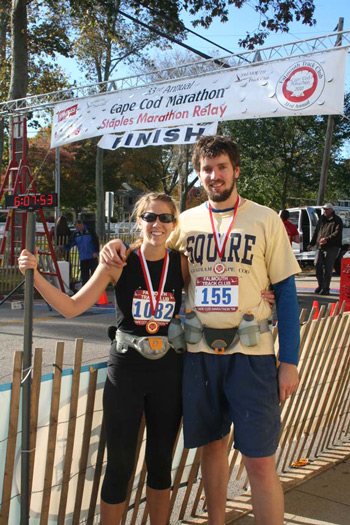Tolley Runs Marathon to Raise Awareness of Fishing Issues
by Tim Wood

Brett Tolley right and his wife Danielle after finishing the marathon, 2010. TBrett Tolley Photo
Brett Tolley knows fishing communities. He grew up in Chatham, the grandson and son of commercial fishermen. His brother is a commercial fisherman. His family’s roots in the industry go back half a century.
Tolley, a 2001 Chatham High School graduate, took a different tack. While majoring in Inter- national Studies at Elon University in North Carolina, he got involved in international border issues through the non-profit organization Borderlinks, the result of which was a 40-minute film titled “Dying To Get In: Undocumented Immigration at the U.S./Mexican Border.”
Now he’s applying what he learned in that experience about how the industrialization of farming and food is forcing people off the land they farmed for generations to the industry that’s in his blood.
“The mistakes made on the farm side are about to be repeated on the fishing side as well,” he said in a telephone interview from his home in Brooklyn.
Tolley is a community organizer and policy advocate for the North Atlantic Marine Alliance (NAMA), a non-profit which aims to “restore and enhance an enduring marine system supporting a healthy diversity and an abundance of marine life and human uses through a self-organizing and self-governing organization,” according to its website.
On Sunday, Tolley will run in the Cape Cod Marathon to raise money for NAMA. If he can raise $10,000, the amount will be matched by a private, anonymous donor. Although he’s never run a marathon before, Tolley started training in April and—despite a tendonitis injury a month ago—expects to go the distance at the Falmouth race.
“I’m definitely excited and looking forward to it,” he said of running 26 miles.
Tolley said the work he’s doing with local fishing communities motivated him to take on the daunting challenge of running 26 miles. Through the work, he was able to see the parallel between fishing families and family farmers in Mexico: global trends that are out of the control of individual fishermen or farmers conspire to create conditions that make their traditional work unsustainable.
“It all starts with creating more sustainable models,” he said. The old models whereby fishermen had to catch a high volume of fish that they sold for a small amount of money do not work anymore. His work with NAMA involves helping to organize local fishing communities to create locally supported fisheries programs that help them achieve the triple bottom line of social, economic, and environmental benefits.
The issue dovetails with concern over locally grown food. People are concerned about where their vegetables come from, who grew them and how they were grown. NAMA is working to convince people they need to show the same concern for fish, Tolley said.
NAMA’s current campaign, “Who Fishes Matters,” has dozens of videos of fishermen testifying about their experiences and concerns, including Chatham’s Shareen Davis.
“Current policy doesn’t factor in who fishes,” said Tolley. “Dead fish are dead fish. They can be caught by an industrial-scale fish company with no connection to the community, or by a family fisherman whose family has fished for generations. What we’re trying to say is that who fishes does matter, and should be inserted into policy decisions.”
His work involves gathering signatures and testimony, testifying before groups like the New England Fisheries Council, and connecting with fishermen, their families and communities who want to keep alive the small-boat fishery that is the backbone of the industry.
This weekend’s marathon also has personal meaning to Tolley. Almost two years ago, he was hit by a speeding van in Brooklyn. He suffered short-term amnesia and traumatic injuries.
“Two years ago I wasn’t even sure if I would be able to walk again,” he said. Part of training and running is to celebrate his recovery from that experience.
It’s also been a year since one of his best friends from Chatham, Ken Owens, died in a skydiving accident in Hawaii.
“A big part of running is to honor Kenny,” said Tolley. “He was always somebody who pushed himself physically to the maximum. I think of those things each day I run.”
To help Tolley reach his goal, visit www.causes.com/causes/show/301581 to donate. Learn more about NAMA at namanet.org.
For information about Tolley’s documentary, Google “Dying To Get In” and click on links video clips as well as interviews about the film.
Story originally appeared in the Cape Cod Chronicle.
